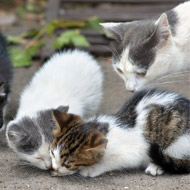Feline charity launches cat census

The scheme will include a number of measures to help build a picture of the number of homeless cats.
A leading feline welfare charity has launched the second phase of a major pilot scheme to track homeless cats in the UK.
Cats Protection’s Cat Watch study now aims to find out the scale of un-owned cats living on the streets of Everton. Through various tools, residents, businesses and community groups are being urged to report stray or untamed feral cats.
It is hoped that by identifying areas with high numbers of cats living on the streets, the charity can better target its neutering work.
Cats Protection’s neutering manager Jane Clements said: “Cat Watch is the first step in helping us find out how many stray and feral cats live outdoors in the UK. If pilot schemes in areas such as Everton prove successful, we hope to eventually replicate it in more parts of the UK.
“Once we’ve identified stray and feral cats living in the area, we’ll be offering help to have them neutered to control unwanted cat populations. By carrying out our Cat Watch scheme in areas like Everton, we hope to eventually be able to get an accurate picture of the number of unowned cats in the UK.”
The scheme will include a number of measures to help build a picture of the number of homeless cats in Everton, including a mobile phone app, community hub, door-to-door engagement and Facebook.
Jane said: “We're concerned about the welfare of these cats, and the impact cat populations have on communities when numbers grow uncontrollably. By tracking these numbers, we can better target our neutering work to help prevent kittens being born on the streets and improve the welfare of those that do."



 The latest
The latest